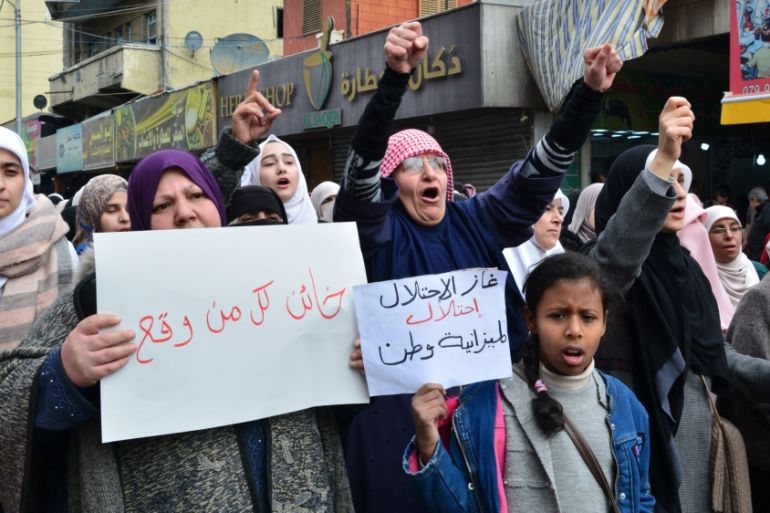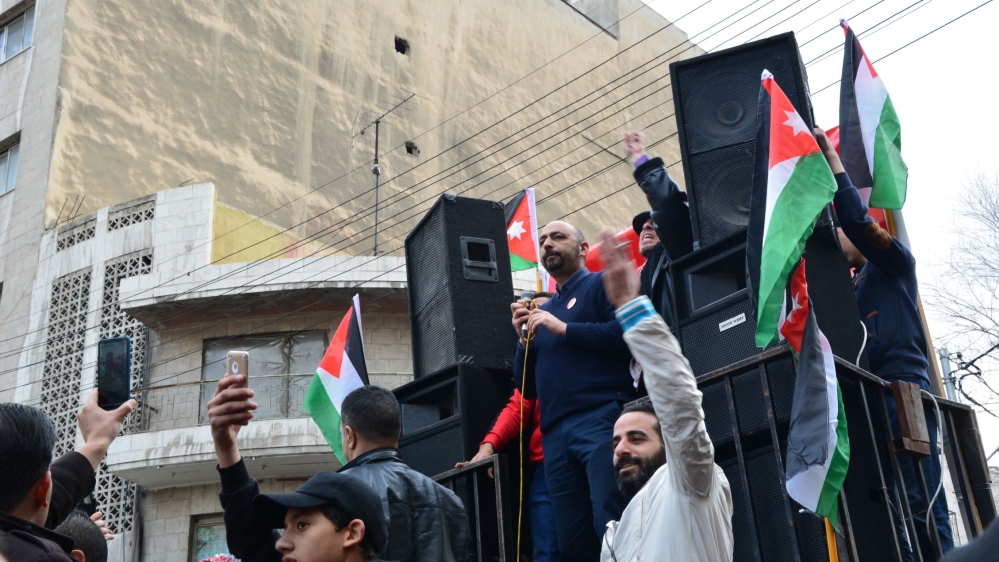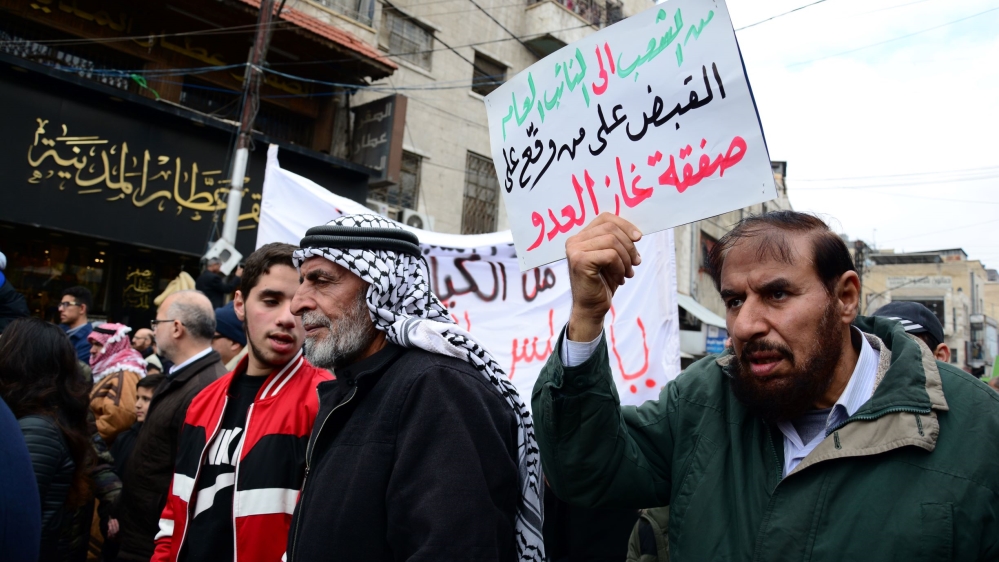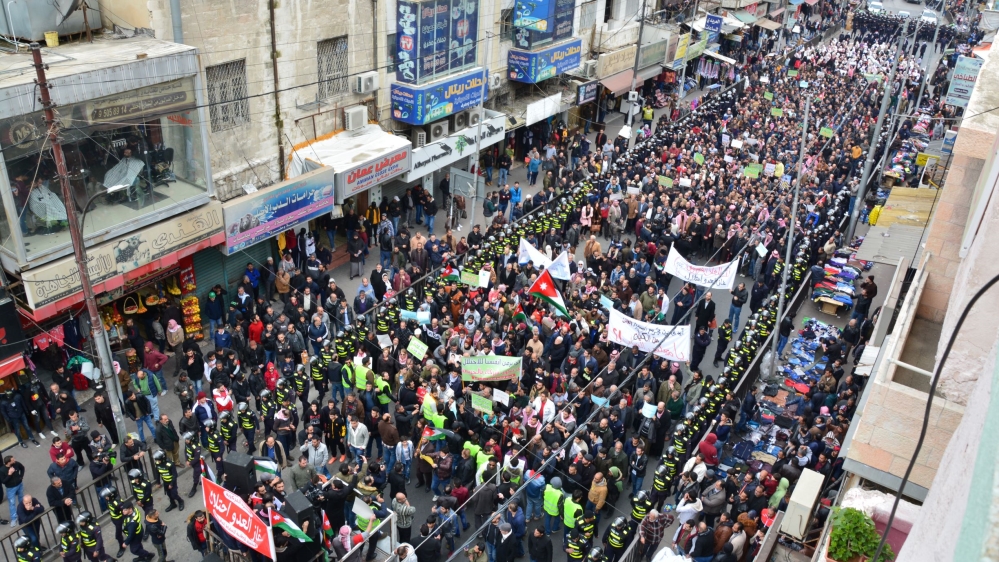Jordanians voice concerns over imports of Israeli gas
Protesters criticise the government in Amman, arguing Jordan’s pro-Palestinian values and environment are at stake.

Amman, Jordan – With her fist raised high, Ibtisam stands at the vanguard of hundreds of protesters who have gathered in Amman to rail against a natural gas deal they believe jeopardises Jordan’s values, its energy sovereignty and the environment.
“The people of Jordan do not compromise! What a shame, what a shame! An agreement full of shame,” the protesters chant in unison.
Keep reading
list of 4 itemsBoeing hit with 32 whistleblower claims, as dead worker’s case reviewed
US imposes new sanctions on Iran after attack on Israel
A flash flood and a quiet sale highlight India’s Sikkim’s hydro problems
The January 17 gathering was the second, held since the beginning of the year when a United States-Israeli consortium began pumping natural gas from Israel’s offshore Leviathan gas field to Jordan.
“We will burn firewood,” the middle-aged Ibtisam tells Al Jazeera. Anything, she says, but “gas from the occupation”.
Over half of Jordan’s population is of Palestinian descent. Ibtisam, who asked Al Jazeera to withhold her surname to protect her privacy, is a Palestinian refugee.
She is part of a grassroots movement that began in 2014, when a letter of intent was first signed between Jordan’s state-owned National Electric Power Company (NEPCO) and the Leviathan field partners, Texas-based Noble Energy and Israel’s Delek Group and Ratio Petroleum.
The deal, which was formally signed in 2016, will see an estimated $10bn worth of Israeli gas sold to Jordan over the next 15 years.
International human rights and environmental justice organisation Platform released a report – in partnership with the Jordanian Coordination Committee Against Importing Gas from Israel – estimating that over half of the expected revenues will go directly into Israeli government coffers.
“It is an agreement of humiliation and shame,” said Mahdi Suleiman, a retired military officer. He joined the protest holding a photo of his son who is being held in an Israeli prison.
‘Wadi Araba is not peace’
Opposition to the gas deal has galvanised unions, political parties, military veterans and women’s associations who argue that it forces normalisation with Israel on every Jordanian household, sidelining Palestinian rights.
“It’s a movement against injustice and settler colonialism,” campaign organiser Hisham Bustani told Al Jazeera. “It’s about holding up an ethical position.”
Broader geopolitical forces are also in the protesters’ crosshairs.

During the January 17 demonstration, people raised their voices in unison against the Wadi Araba peace treaty, signed between Jordan and Israel in 1994.
“Wadi Araba is not peace!” protesters shouted. “Wadi Araba is treason!”
Demonstrators also pointed to the role the US has played helping to cement Israeli-Jordanian energy ties.
“The US administration played a huge role in orchestrating this deal,” said Bustani.
In 2011, Hillary Clinton, then the US secretary of state, reportedly raised the gas issue with Jordan’s King Abdullah II.
And Jordan is not the only regional customer for gas from Israel’s Leviathan field. Egypt also started importing it this month.
Economic benefits
The terms of the gas deal were only made public in 2019 by an opposition MP, leading to charges of a lack of transparency.
The Jordanian government maintains that the gas deal will help stabilise energy prices and generate annual savings of at least $500m – helping to reduce a chronic budget deficit.
But some experts have questioned the deal’s economic benefits, arguing that Jordan gets enough liquefied natural gas (LNG) – largely from Qatar – through the Aqaba gas terminal built in the south of the country.
Jordan’s Ministry of Energy and NEPCO did not respond to Al Jazeera’s requests for comment.

On January 19, the Jordanian parliament approved a draft law to ban imports of Israeli gas. The government said it would review the motion. But if the past is any guide, it is unlikely to find traction.
While the members of the parliament are elected, the cabinet of ministers that forms the government is appointed by the king.
In December 2014, the parliament also voted against the deal, but the government pressed ahead with the agreement and has continued to defend it.
Investing in renewable energy
Opponents also question the value of ploughing money into fossil fuel infrastructure.
“Instead of investing in Jordan to develop the economy and to create job opportunities, we are spending billions of dollars to buy subordination,” said Bustani.
Environmental campaigners argue the money would have been better spent developing sustainable energy sources.
“Jordan has a very big potential for renewable energy,” says Rami Barhoush, president of the nonprofit Arab Group for the Protection of Nature (APN). “We have more than 310 days of sunshine a year and vast areas of land capable of producing wind energy,” he told Al Jazeera, adding that the gas pipeline had destroyed land and affected several villages in Jordan.
APN has led planting initiatives to replace trees uprooted by the pipeline.
This month, Jordan’s ambassador to the United Arab Emirates and its permanent representative to the International Renewable Energy Agency (IRENA) said some $5bn has been invested in the country’s sustainable energy sector, and renewables are on track to provide 20 percent of the country’s total power output by 2021.
In 2017, Jordan announced the Green Corridor, a new project to allow solar and wind power produced in the south of the country to be transmitted to population centres.
But in January 2019, the Jordanian government suspended approvals for large-scale renewable energy projects until technical studies to assess the capacity of the electrical grid are completed.

Experts say Jordan is already generating more energy than it consumes but does not have the storage capacity to fully utilise it.
“This decision was made because the network needs to be updated,” said Ahmad Harb, a professor at the German Jordanian University who specialises in renewable energy.
“Until this problem is solved, we are limited in our production of renewable energy,” he told Al Jazeera.
Since the deal obliges Jordan to import a certain amount of gas over 15 years, experts fear it will restrict the introduction of renewable energy to the grid and the development of local energy resources.
“It would be better if the government invested in upgrading the network and allowed more investment in renewable energy,” said Harb.
Energy and environment expert Ayoub Abu Dayyeh also told Al Jazeera the gas deal is a blow to efforts to produce clean, sovereign energy.
“Why pay those $10bn for energy coming from the outside?” he asked rhetorically. “Are our governments democratic enough to take decisions that look after the wellbeing and interests of the population?”